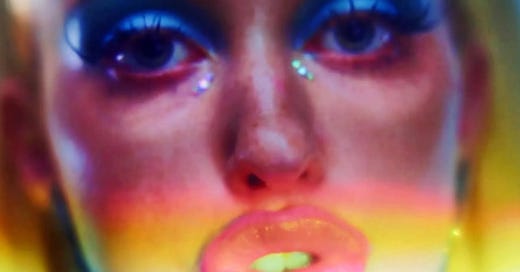The pre screening visual began with the ‘you’re in a coma’ copypasta which always scares the shit out of me and ruins my week, which made me wonder if i was about to see a horror film. (I have since returned to the theatre and saw the same intro again, so it was not unique to this film in particular)
Caroline Calloway was the host and moderator of the Q&A, though this was her first time seeing the film. In Calloway’s introduction, she says the at the afterparty we’ll “party like its 2022.” That depressed me a little, though I understand. That wasn’t so long ago! Why does it feel like a complete other time? And not depressed as in longing for it nostalgically, but as in: can we slow down? We’re still in that time period, and we’ll know that 10 years from now.
The film follows Rachel, who was raised in captivity by an advertising agency and forced to give ratings to her favorite pop star: Mommy 6.0. I should’ve asked this when I had the chance, but what happened to the first 5 mommies? Whatever, doesn’t matter. Rachel is the actual biological child of mommy 6.0 and doesn’t know it, both of them were given to the company by her mother when she was a baby. Out of desperation? Poverty? This isn’t made explicit but can be inferred.
The film shifts between Rachel in her room (pod), talking to her only friend, Poorspigga, a digital avatar on a screen, as well as her masturbating on a body pillow of Mommy 6.0. She then is taken to a room with three panelists, asking her to rate Mommy 6.0’s performances, to which she always gives all 10s (except when she startlingly gives a 9, then takes it back).
Most of the movie takes place in a black box theatre where an audience witnesses performances by Mommy 6.0, and by Rachel in her various new jobs such as joining a family content house with Dasha Nekrasova playing her sister as well as Peter and Betsey’s real parents as the parents, and an unsuccessful stint doing product demonstrations for a vibrator until screaming in pain.
The audience becomes a physical embodiment of an Internet comment section, giving their unsolicited critiques or over sharing personal stories in response to whoever is on stage. The unscripted nature of the stories makes it seem as though the actors were real people who wandered in from the street, and though they were found in a more typical casting process, it was not too much unlike the former.
Does the movie make itself critic-proof by including its own self aware critique in the form of depicting any dissenters as rude audience members, claiming the performances (and film itself) are racist, ableist, etc? Does it effectively avoid any responsibility by having its characters proclaim their own ignorance (“the smartest thing you can say is I don’t know”) or ambivalence (“I did it for no reason, as a joke”).
Peter Vack is a meme artist, posting online is his language and his method towards taste-making, propelling his name and work forward. But with internet memes, the cycle moves faster than anyone can make and distribute a feature film (at least for now) and the film already feels outdated. Vack says he isn’t bothered by this, and sees the film as a sort of time capsule. I think this is a useful lens for the film, but I wonder if I showed it to people not well versed in r/redscarepod, Dimes Square, downtown NYC internet culture, would they feel like it incapsulated the culture at the time for them? It doesn’t have to extend beyond its specific scene if it functions as an archival relic. Is this a cop out? Does that even matter?
One can be quick to dismiss the film entirely based on its shock humor, niche references, and the immediacy with which it became outdated, but I think there’s value in a project like this. As Caroline Calloway said as hostess: Dimes Square as a scene was more known for talking about the idea of art more than making it (not sure how true that really is in retrospect, but in reputation it was true) and, “They really did the damn thing.” Should we reward people just for trying? At this point, I say sure. It was visually striking, engrossing regardless of subjective opinion, and its a useful cultural artifact.




